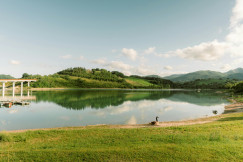Articles
27 May 2025
Content Highlights: Regenerative Green Transition April and May 2025
Articles
27 May 2025
Regenerative Green Transition
Proximity and social economy
Agri-food
+63 more
Login / create an account to be able to react

As Europe accelerates its transition towards a greener future, the social economy plays a key role in pioneering sustainable and community-driven solutions. From citizen-led energy initiatives to ethical tourism models, these best practices showcase how regenerative approaches can drive systemic change while fostering resilience, inclusivity, and environmental stewardship. The following highlights demonstrate the transformative impact of social economy actors in the green transition, reinforcing the importance of collaboration and innovation in building a more sustainable future.
Topics
Albania
Armenia
Austria
Belgium
Bosnia and Herzegovina
Bulgaria
Croatia
Cyprus
Czechia
Denmark
Estonia
EU-27
Finland
France
Georgia
Germany
Greece
Hungary
Iceland
Ireland
Italy
Kosovo
Latvia
Liechtenstein
Lithuania
Luxembourg
Malta
Moldova
Montenegro
Netherlands
North Macedonia
Norway
Poland
Portugal
Romania
Serbia
Slovakia
Slovenia
Spain
Sweden
Switzerland
Türkiye
Ukraine
Academic / Research and VET Institutions
Business Support Organisation
Company with 250 or more employees
Cluster Organisations
Consumer Organisations
Cultural and Heritage Organisations
Destination Management & Marketing Organisations
EU Institutions
Financial Institutions and Investors
Industry Associations and Chambers of Commerce
International Organisations
Local Authorities
Media / Journalist Organisations
National authorities
Networks and Federations / Confederations
NGOs / Non-profits
Notified Bodies
Regional Authorities
SMEs (a company with less than 250 employees)
Social Economy Entity
Trade Unions
Other
-
Thematic area
-
-
Regenerative Green Transition
-
-
Interlinkages with other sectors
-
-
Proximity and social economy
-
Agri-food
-
Construction
-
Cultural and creative industries
-
Digital
-
Electronics
-
Energy intensive industries
-
Energy-renewables
-
Health
-
Mobility, transport, automotive
-
Retail
-
Textile
-
Tourism
-
Aerospace and defence
-
-
Action areas and keywords
-
-
15-minute city
-
Access to Finance
-
Access to technology
-
Addressing capacity and skills gap
-
Advancing gender equality and safety at work
-
Blue Economy
-
Boosting digital skills by - and in the social economy
-
Buy social
-
Certification, labelling and self-regulation
-
Circular Economy
-
Clusters (including Cluster of social and ecological innovation)
-
Corporate social responsibility (CSR)
-
Creating financial incentives and supportive regulation for green and circular social economy business models
-
Data Maturity and data driven business models
-
Data sharing, Data management & Code of Conduct
-
Digital Platforms
-
Digital social innovation
-
Economic democracy
-
Education
-
Future workplaces
-
Greening infrastructures and business operations
-
Housing
-
ICP rights & workers involvement
-
Industrial relation and social dialogue
-
Innovation
-
Innovation as enabler for green transition and business development in the social economy
-
Internationalisation
-
Local employment
-
Local Green Deals, green business communities and citizens’ initiatives
-
Local Markets
-
Micro mobility
-
New business models
-
New business models – the platform economy
-
New European Bauhaus
-
Other action area
-
Public and private tech partnerships and support
-
Reinforcing Business to Business collaboration for greener and circular value chains
-
Responsible (Public) Procurement
-
Smart mobility
-
Social Finance
-
Socially oriented territorial regeneration
-
Strategy for Data
-
Supporting Digital Social Innovation & Tech for Good entrepreneurship
-
Sustainable Finance
-
Tech for Good
-
-
Ecosystem focus
-
-
Proximity economy
-
Social economy
-
-
Scope of activity
-
-
International
-
Local/neighbourhood
-
National
-
Regional
-
Share
Abacus: Education and Culture as Drivers of Social Change
Abacus is a cooperative dedicated to making education, culture, and leisure accessible to all through a model rooted in social economy values. With over 50 years of experience, it fosters social transformation by offering quality educational and cultural content while ensuring transparency, participation, and equity. By embracing digitalisation and networking with like-minded organisations, Abacus remains committed to linguistic diversity, pluralism, and conscious consumption, reinforcing its role as a key player in shaping a more inclusive and innovative society.
Cooperative Housing: A Community-Led Solution to Urban Challenges
Cooperative housing presents a sustainable, community-driven alternative to traditional housing markets, tackling affordability, social cohesion, and sustainability challenges. By shifting ownership from private investors to residents, cooperatives remove profit motives, ensuring long-term accessibility. Democratic governance and integrated urban planning further enhance the model’s success, fostering resilient and inclusive communities. As cities worldwide face rising housing costs and gentrification, cooperative housing offers a viable, people-centred solution that prioritises social equity over speculation.
Casalina: Building sustainable local resilience
Casalina is a trans-local community based in Spinazzola and Brussels. They address emerging social and environmental challenges, embodying a global dynamic transition. A social agriculture project launched by the BSR Collective in Puglia, Italy, that represents more than just a farm - it serves as a community hub fostering solidarity, resilience, and knowledge-sharing. By revitalising an abandoned farmhouse through reforestation, permaculture, and sustainable agriculture, Casalina creates a model for sustainable rural development. It supports migrant workers, provides essential services, and engages the local community in climate action. As part of the Communities for Climate (C4C) initiative, Casalina demonstrates how proximity economy and social economy principles can drive meaningful environmental and social change.
Cerro Torre: Inclusive Employment and Environmental Sustainability in Social Enterprise
Cerro Torre is a social cooperative focused on integrating disadvantaged individuals—those with disabilities, addictions, or in detention—into the workforce. It provides waste management, renewable energy installations, and boiler services while promoting professional growth and social inclusion. The cooperative prioritises continuous improvement in quality, safety, and environmental sustainability. Since 2005, it has specialised in renewable energy, installing over 1,300 systems in Lombardy, saving 4,200 tons of CO₂. Certified for quality and safety, Cerro Torre fosters personalised work-integration paths, ensuring dignity and long-term employment for vulnerable individuals.
Lormes, France: A digital village of the future
Lormes, a rural town in France, transformed itself into a “Village of the Future” through community-driven digital innovation. By launching initiatives like a digital hub, fibre network, and participatory planning, it addressed challenges of depopulation, digital exclusion, and economic decline. Today, Lormes stands as a leading example of rural regeneration through citizen-led digital transformation.
Comments (0)
See also
-
5
Regenerative Green Transition Highlights June and July 2025
- Categories
- Proximity and social economy Agri-food Construction +62 more
-
1 view
Urban and Rural Wellbeing Highlights: June and July 2025
- Categories
- Proximity and social economy Agri-food Construction +62 more
-
4
Partnerships Highlights April and May 2025
- Categories
- Proximity and social economy Agri-food Construction +62 more




